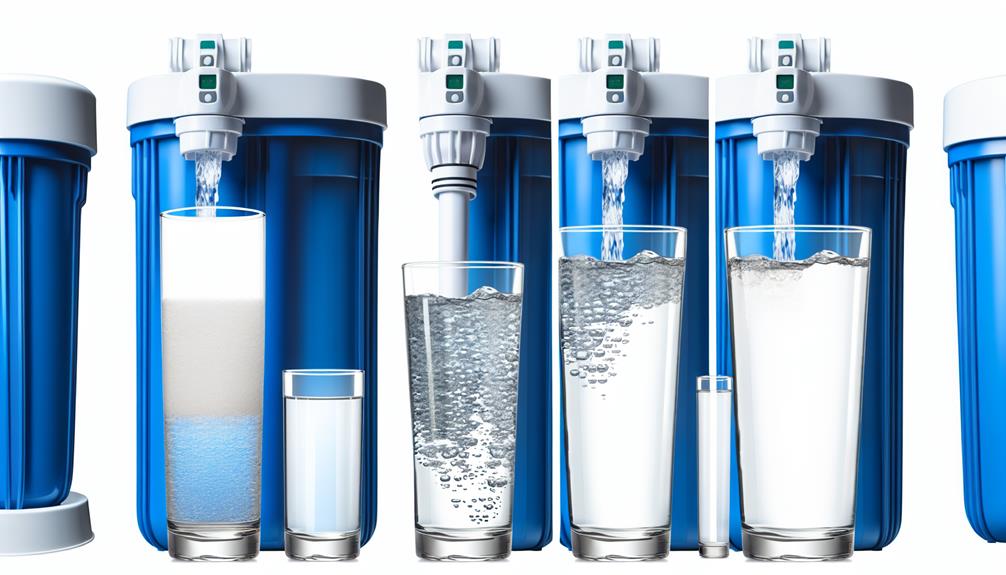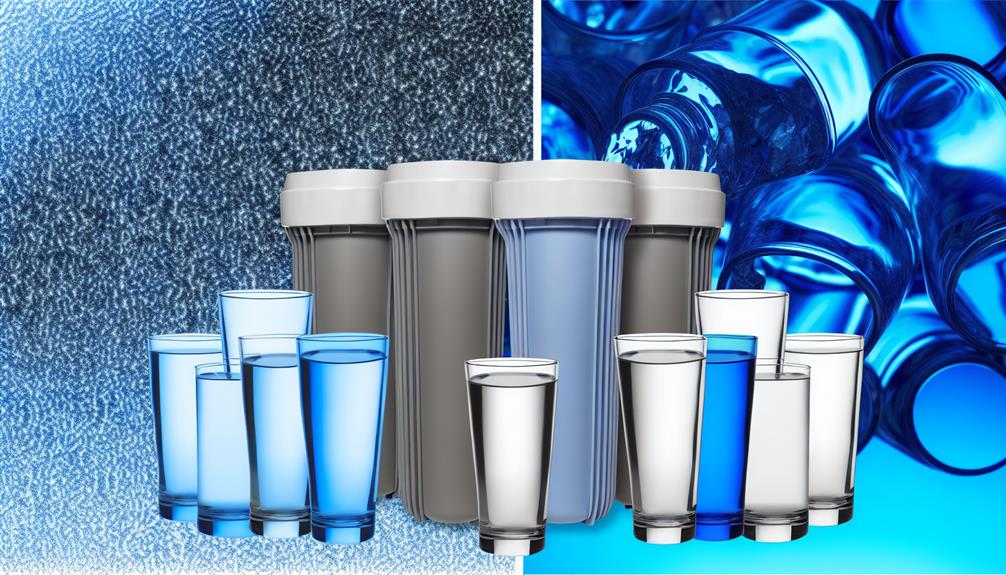As you consider the crystal-clear benefits of a whole home water filtration system, you're likely wondering about the murkiness of its cost. Let's demystify the financial aspects that accompany such a vital home improvement.
You're diving into a pool of variables, including the type of system you choose, the complexity of your home's plumbing, and additional features you may desire. On average, installation costs can range significantly, but you'll find that they're just the tip of the iceberg.
You'll need to account for the unseen expenses that lurk beneath the surface—ongoing maintenance, filter replacements, and potential modifications to your existing plumbing.
As we outline the costs that can influence your budget, you'll discover the importance of considering the long-term investment over the initial price tag, ensuring you make an informed decision that safeguards both your health and your wallet.
Understanding Water Filtration Needs
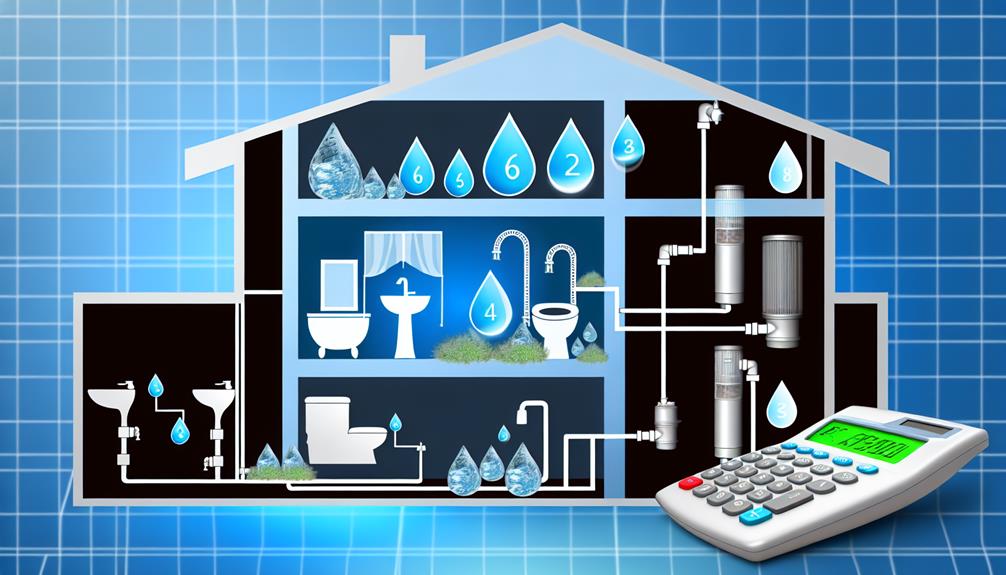
Before investing in a water filtration system, you need to assess your specific water quality concerns and the contaminants you aim to remove. Conducting comprehensive water testing is an indispensable step in this process. It's not just about ensuring palatable water; it's about safeguarding your health and protecting your home's plumbing infrastructure from potentially corrosive or scale-forming substances.
When you're considering a whole home water filtration system, you'll often encounter terms like 'TDS' (Total Dissolved Solids), 'hardness,' and 'pH levels.' These are critical parameters that a thorough contaminant analysis will measure. TDS, for example, is a broad indicator of water quality, while hardness specifically speaks to the concentration of calcium and magnesium ions—culprits behind scale buildup that can impair your fixtures and appliances.
Professional insight dictates that you don't overlook biological contaminants either. Testing should include microbial analysis to detect the presence of bacteria, viruses, or protozoans. Depending on the results, you might need a UV purification step added to your filtration system.
Types of Whole Home Filters
Dive into the world of whole home water filters where options range from sediment pre-filters to advanced reverse osmosis systems, each designed to target specific impurities and meet varying household water quality demands. Your choice hinges on the specific contaminant removal required and the desired filter longevity, two crucial factors in maintaining water quality and system efficiency.
- Sediment Filters: These are the first line of defense, trapping dirt, rust, and other large particles. They're essential for protecting downstream filters from clogging and typically feature a lower replacement frequency, boosting filter longevity.
- Activated Carbon Filters: Utilizing adsorption, these filters excel at removing chlorine, volatile organic compounds (VOCs), and odors, enhancing both taste and smell of your water. Their efficacy in contaminant removal varies based on carbon quality and contact time.
- Ion Exchange Units: Designed primarily for water softening, they're adept at reducing scale and swapping hardness ions like calcium and magnesium with sodium or potassium, thereby prolonging the lifespan of your plumbing and appliances.
- Reverse Osmosis (RO) Systems: Offering the pinnacle of purification, RO systems forcefully remove up to 99% of dissolved solids, including fluoride and arsenic. These systems require more frequent maintenance to sustain peak contaminant removal efficiency.
Average Installation Costs
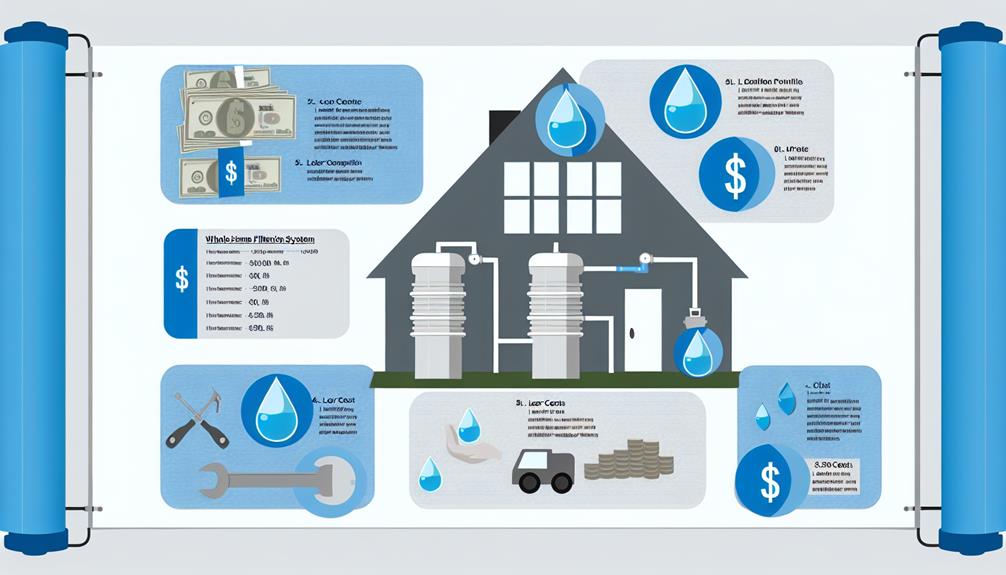
Now that you've explored the various whole home water filter options, let's examine the average installation costs you can expect to incur for these systems.
The investment hinges on system complexity, capacity, and integration requirements. Generally, installation costs for a basic sediment filter may range from $150 to $300, assuming standard labor rates apply.
For more advanced systems, such as reverse osmosis or whole house carbon filters, you're looking at an installation price range of $500 to $2,500. These figures reflect both the labor and ancillary materials needed to complete the setup.
It's crucial to factor in the filter lifespan, as higher-end models with extended service lives may offer cost savings over time despite a higher initial outlay.
The installation timeframe also influences the cost. A standard installation might take 2 to 4 hours, billed at an hourly rate by a certified plumber. However, complex systems requiring additional plumbing or retrofitting can extend the timeframe substantially, thereby increasing labor costs.
Additional Expenses to Consider
When budgeting for a whole home water filtration system, it's essential to account for additional expenses that extend beyond the basic installation costs. These costs can affect the total investment and should be factored into your financial planning to ensure the system performs optimally throughout its lifespan. Here's a breakdown:
- Pre-filtration Requirements: Depending on your water quality, a sediment pre-filter might be necessary to protect the main filtration unit from large particles, which could increase upfront costs and require periodic replacement.
- Maintenance and Service Plans: Regular maintenance is paramount for system efficacy. Consider enrolling in a service plan that covers filter changes, UV bulb replacements, and system inspections, to mitigate long-term operational costs.
- Filter Warranties: Scrutinize the warranty details for each component of your system. Extended warranties can offer peace of mind but may come with an additional price tag. Ensure that the cost-benefit analysis aligns with your expectations for system longevity and performance.
- Financing Options: If the upfront cost is prohibitive, explore financing options. Many providers offer plans that can spread the cost over time, but be aware of interest rates and total finance charges to avoid paying significantly more over the long term.
Maintenance and Long-Term Costs
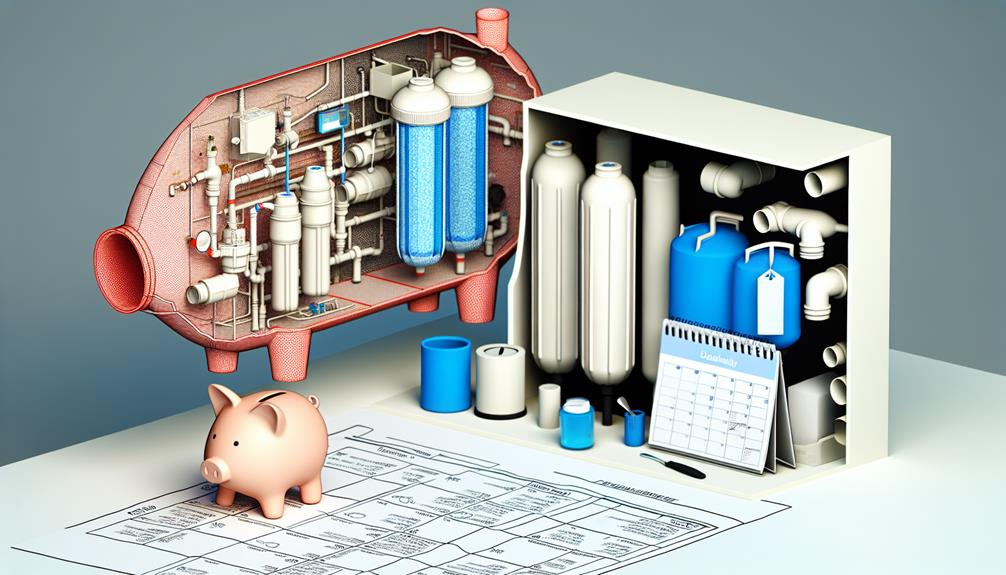
Understanding the ongoing maintenance requirements and associated long-term costs is crucial for ensuring your water filtration system remains efficient and cost-effective over its operational lifetime. You'll need to consider the filter lifespan, which dictates the frequency of filter replacements. Pre-filters, for instance, may require biannual changes, while main filters can last several years. Monitoring these lifespans ensures your system isn't compromised by saturated filters, which can reduce water quality and flow rate.
Warranty coverage is another aspect you can't overlook. A robust warranty can mitigate unforeseen expenses, covering replacement parts or labor costs for repairs. Ensure you're familiar with the warranty's scope and duration to maximize its benefits.
Here's a breakdown of typical maintenance tasks and long-term costs:
| Maintenance Task | Approximate Cost (USD) |
|---|---|
| Biannual Pre-filter Change | $50-100 |
| Main Filter Replacement | $200-500 |
| System Sanitization | $100-300 |
Conclusion
You've navigated the complexities of whole-home water filtration and weighed the initial outlay against ongoing maintenance. Remember, the ROI extends beyond mere economics; it's about ensuring your home's H2O purity.
Factor in the consumables, labor, and potential system upgrades. Stay proactive with regular check-ups to avoid costly repairs down the line.
Invest wisely, and the dividends paid in water quality and peace of mind will underscore the value of your state-of-the-art filtration system.
